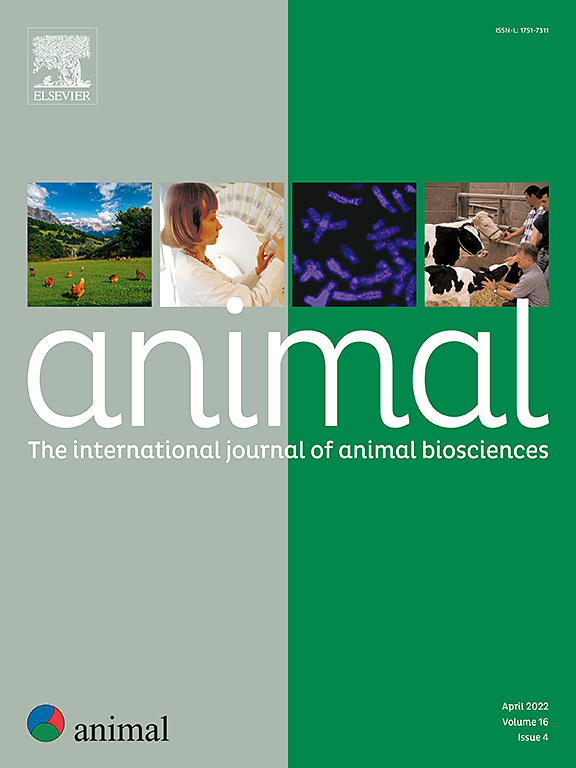马匹福利设施之间的差异:管理/工作条件的轻微差异可能就足够了
IF 4.2
2区 农林科学
Q1 AGRICULTURE, DAIRY & ANIMAL SCIENCE
引用次数: 0
摘要
许多研究从具体的行为或生理指标或特定管理因素的影响方面关注动物福利。然而,动物的福利状态来自于个体对其一般环境的感知,这在行为和生理层面上都有影响。先前对马的研究表明,不同的骑术学校可能具有不同的马的情感/认知特征,有时与一个单一的管理因素有关。在本研究中,我们旨在确定这种特定设施的马的特征是否也可以在福利方面找到,即特定设施的“福利特征”,使用多方面的方法,根据详细的行为、健康和生理测量来评估动物的福利状态。共有59匹马来自三个不同的骑术学校,具有非常相似的全球传统管理,但在出勤频率和骑术方面略有不同。主成分分析和统计比较表明,尽管三个地点之间的管理非常相似,但马的福利状态非常不同,并且每个结构都具有特殊性。因此,本研究使用行为、健康和生理指标,强调了设施马福利概况的存在,并揭示了即使管理实践中明显的微小差异也可能对马的福利状态产生重大影响。骑马工作的质量可能是一个主要问题,而在对马匹福利的研究中往往没有考虑到这一点。本文章由计算机程序翻译,如有差异,请以英文原文为准。
Differences between facilities in horse welfare profiles: slight differences in management/working conditions may be enough
Many studies focus on animal welfare in terms of specific, either behavioural or physiological, indicators or on the impact of a particular management factor. However, an animal’s welfare state results from the individual’s perception of its general environment, which has consequences at both behavioural and physiological levels. Previous research on horses has shown that different riding schools could be characterised by different emotional/cognitive profiles of horses, in relation sometimes with one single management factor. In the present study, we aimed at determining if such facility-specific horse profiles could also be found in terms of welfare, i.e. facility-specific “welfare profiles”, using a multifaceted approach where animals’ welfare state was assessed based on detailed behavioural, health and physiological measurements. A total of 59 horses from three different riding schools, with a very similar global conventional management but differed slightly in terms of turn-out frequency and riding techniques were studied. A principal component analysis and statistical comparisons showed that, despite the close similarity in management between the three sites, the horses’ welfare state was very different and specific to each structure. Thus, this study using behavioural, health and physiological measures, highlights the existence of facility horse welfare profiles and reveals that even apparently minor differences in management practices could have a major impact on the horses’ welfare state. The quality of ridden work, which is often not taken into account in studies on horse welfare, could be a major issue.
求助全文
通过发布文献求助,成功后即可免费获取论文全文。
去求助
来源期刊

Animal
农林科学-奶制品与动物科学
CiteScore
7.50
自引率
2.80%
发文量
246
审稿时长
3 months
期刊介绍:
Editorial board
animal attracts the best research in animal biology and animal systems from across the spectrum of the agricultural, biomedical, and environmental sciences. It is the central element in an exciting collaboration between the British Society of Animal Science (BSAS), Institut National de la Recherche Agronomique (INRA) and the European Federation of Animal Science (EAAP) and represents a merging of three scientific journals: Animal Science; Animal Research; Reproduction, Nutrition, Development. animal publishes original cutting-edge research, ''hot'' topics and horizon-scanning reviews on animal-related aspects of the life sciences at the molecular, cellular, organ, whole animal and production system levels. The main subject areas include: breeding and genetics; nutrition; physiology and functional biology of systems; behaviour, health and welfare; farming systems, environmental impact and climate change; product quality, human health and well-being. Animal models and papers dealing with the integration of research between these topics and their impact on the environment and people are particularly welcome.
 求助内容:
求助内容: 应助结果提醒方式:
应助结果提醒方式:


